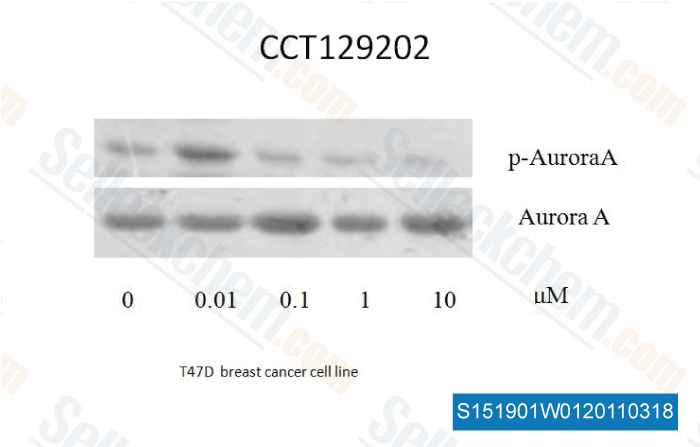|
Toll Free: (877) 796-6397 -- USA and Canada only -- |
Fax: +1-832-582-8590 Orders: +1-832-582-8158 |
Tech Support: +1-832-582-8158 Ext:3 Please provide your Order Number in the email. |
Technical Data
| Formula | C23H25ClN8OS |
|||
| Molecular Weight | 497.02 | CAS No. | 942947-93-5 | |
| Solubility (25°C)* | In vitro | DMSO | 3 mg/mL (6.03 mM) | |
| Water | Insoluble | |||
| Ethanol | Insoluble | |||
|
* <1 mg/ml means slightly soluble or insoluble. * Please note that Selleck tests the solubility of all compounds in-house, and the actual solubility may differ slightly from published values. This is normal and is due to slight batch-to-batch variations. * Room temperature shipping (Stability testing shows this product can be shipped without any cooling measures.) |
||||
Preparing Stock Solutions
Biological Activity
| Description | CCT129202 is an ATP-competitive pan-Aurora inhibitor for Aurora A, Aurora B and Aurora C with IC50 of 0.042 μM, 0.198 μM and 0.227 μM, respectively. It is less potent to FGFR3, GSK3β, PDGFRβ, etc. | ||||||
|---|---|---|---|---|---|---|---|
| Targets |
|
||||||
| In vitro | CCT129202 is an ATP-competitive inhibitor of recombinant Aurora A kinase with a Ki of 49.8 nM. CCT129202 at 1 μM shows high selectivity for Aurora A and Aurora B with 92% and 60% inhibition, respectively. It inhibits FGFR3 slightly by 27%, and is not active against CRAF. CCT129202 inhibits proliferation in multiple cultures of human tumor cell lines with half-maximal growth inhibition (GI50) values ranging from 0.08 μM for MV4-11 to 1.7 μM for MDA-MB-157. The effects are in association with increased expression levels of Aurora A and Aurora B leading to aberrant mitosis. Treatment with CCT129202 (0.7 μM) causes the accumulation of HCT116 cells with ≥4N DNA content, leading to apoptosis in a time dependent manner. Application of CCT129202 in HCT116 cells causes decreased histone H3 phosphorylation and increased p53 protein stabilization, which are consistent with the inhibition of Aurora B and Aurora A, respectively. CCT129202 induces up-regulation of p21 in HCT116, HT29 and Hela cells in a p53 dependent and independent manner, which leads to decreased phosphorylation of the Rb protein and activity of E2F in a concentration-dependent manner. [1] | ||||||
| In vivo | Administration of CCT129202 at 100 mg/kg in athymic mice bearing s.c. HCT116 colon cancer xenografts causes ~50% reduction of histone H3 phosphorylation after 30 minutes of treatment, and significantly inhibits tumor growth by 57.7% compared to control mice after a period of 9 days of treatment. [1] |
Protocol (from reference)
| Kinase Assay:[1] |
|
|---|---|
| Cell Assay:[1] |
|
| Animal Study:[1] |
|
Customer Product Validation

-
Data independently produced by Dr Zhang of Tianjin Medical University,
Selleck's CCT129202 has been cited by 5 publications
| Identification of SYK Inhibitor, R406 as a Novel Senolytic Agent [ Aging (Albany NY), 2020, 7;12(9):8221-8240] | PubMed: 32379705 |
| Targeted Polo-like Kinase Inhibition Combined With Aurora Kinase Inhibition in Pediatric Acute Leukemia Cells. [ J Pediatr Hematol Oncol, 2019, 41(6):e359-e370] | PubMed: 30702467 |
| Aurora Kinases as Druggable Targets in Pediatric Leukemia: Heterogeneity in Target Modulation Activities and Cytotoxicity by Diverse Novel Therapeutic Agents [Jayanthan A, et al. PLoS One, 2014, 9(7):e102741] | PubMed: 25048812 |
| Targeting Sonic Hedgehog-Associated Medulloblastoma through Inhibition of Aurora and Polo-like Kinases. [Markant SL, et al. Cancer Res, 2013, 73(20):6310-22] | PubMed: 24067506 |
| Enhancing Chemosensitivity in ABCB1- and ABCG2-Overexpressing Cells and Cancer Stem-like Cells by An Aurora Kinase Inhibitor CCT129202. [Cheng C, et al. Mol Pharm, 2012, 9(7):1971-82] | PubMed: 22632055 |
RETURN POLICY
Selleck Chemical’s Unconditional Return Policy ensures a smooth online shopping experience for our customers. If you are in any way unsatisfied with your purchase, you may return any item(s) within 7 days of receiving it. In the event of product quality issues, either protocol related or product related problems, you may return any item(s) within 365 days from the original purchase date. Please follow the instructions below when returning products.
SHIPPING AND STORAGE
Selleck products are transported at room temperature. If you receive the product at room temperature, please rest assured, the Selleck Quality Inspection Department has conducted experiments to verify that the normal temperature placement of one month will not affect the biological activity of powder products. After collecting, please store the product according to the requirements described in the datasheet. Most Selleck products are stable under the recommended conditions.
NOT FOR HUMAN, VETERINARY DIAGNOSTIC OR THERAPEUTIC USE.
